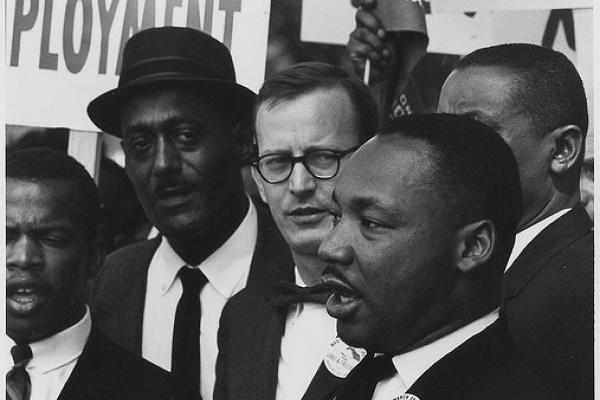If the latest Billboard album chart is anything to go by, the answer to Victor Hugo’s question “Do you hear the people sing”? is a resounding “Yes!” as the soundtrack to the latest film adaption of his novel has hit number one. More ambiguous however, is the answer to the question: do we understand what they are singing?
Many know of Dr. Rev. Martin Luther King Jr.’s “Letter from a Birmingham Jail.” Fewer know of Dr. King’s letter from a Selma jail where he wrote, “If we are to achieve a real equality, the U.S. will have to adopt a modified form of socialism.” This week will see President Obama sworn into office by laying his hand upon the Bible of America’s greatest preacher and prophet, M.L. King. If the appropriateness of King’s radical legacy being invoked by Obama goes beyond being skin deep, might we also ask the question: do we hear and understand the song Martin King sung?
As many blogs will brim with praise for Martin Luther King, Jr., with little mention of his politics, so too are they awash with praise for the latest Les Misérables film without mention of its vision for society. They praise Hugh Jackman and Anne Hathaway’s ability to blubber while beautifully belting out ballads. They have shown the Christian virtue of mercy to Russel Crowe’s singing (at least more mercy than the infamous critique of his musical ability by Australian punk band Frenzal Rhomb). All this before moving on to talk of Les Misérables’ less-than-subtle Christian themes.
As CNN reported, since the micro-targeted marketing success of movies like The Passion of the Christ, film studios have been courting Christians to exchange their pews for popcorn and Gospel songs for cinema going. Again, this time with Les Misérables, the faithful have responded to the box office like it was an altar call offered with Dr. King’s eloquence.
As the flu outbreak spreads across 48 states, some religious leaders are advising their flocks to take precautions, but others say avoiding infection is just a matter of common sense.
Several Catholic dioceses, including Manchester, N.H., Boston, and New York, are advising priests to consider not offering the shared chalice of consecrated wine at Holy Communion at Masses. Communicants would only receive the consecrated wafer.
In addition, Manchester Bishop Peter Libasci had other suggestions, reported The Eagle Tribune of North Andover, Mass.
“The faithful should be encouraged to share the Sign of Peace without touching hands or kissing,” he said. “This may be done with smiles and a bow of the head in reverence to one another.”
New reports this afternoon are that House Republicans have agreed to vote next week on extending the debt ceiling for about three months, giving time for passage of a budget. The agreement would not require immediate spending cuts, a retreat from the previous GOP position. Democrats so far have responded cautiously to the plan for a short-term increase.
According to the Washington Post:
“House Republicans will scale back their ambitions in an upcoming fight over the nation’s borrowing limit, saying Friday that they will try to pass a bill next week to raise the debt ceiling for three months. But they indicated that the Senate must pass a budget before the lawmakers would agree to a longer-term increase in the limit.
“Under a bill to be considered next week, members will propose raising the debt ceiling through mid-April -- long enough, they say, to give both chambers time to pass a budget. Under the measure, if either chamber fails to adopt a budget by April 15, Congress would not be paid.”
"The arc of the moral universe is long but it bends towards justice," proclaimed the Reverend Dr. Martin Luther King, Jr.
It may bend towards justice, but it does not bend gently. It bends behind sweat of the brow, creativity of the mind, and love from the soul of those who believe that every living soul not only desires justice and equality, but has a right to it. You see, justice is not a passive pursuit. The moral arc will not bend without encouragement.
Dr. King was a living example of the kind of person who encourages the moral arc of history to bend toward justice. He is also an example of the only effective way to bend that arc — non-violently. We cannot hope to bring about justice by unjust means. Might, physical confrontation, and other forms of domination will ultimately only result in nurturing an understanding that domination is an ineffective way to resolve issues of justice — and domination is the exact opposite of justice. As King says, "Hate begets hate; violence begets violence; toughness begets a greater toughness. We must meet the forces of hate with the power of love."
Listen, I’m not here to bash Manti. I’m not here to ridicule or mock him. I’m not even suggesting that Manti is lying or that his statement is not accurate but we can all agree that the whole story is absolutely bizarre and the total truth has yet to be fully revealed. But because I’m a believer in people – and more so – because I believe in the power of redemption, reconciliation, and restoration, I want to see Manti do well – not just as a football player – but as a man … as a human being … and as someone who often speaks of God.
If I were Manti’s pastor …
While more details will emerge in the future, I wondered what kind of advice I would give him if I were Manti’s personal pastor. (Manti, being Mormon, is supposedly a deeply religious person.) Here are the four pieces of advice I’d give him.
Four decades after Roe v. Wade, the landmark Supreme Court ruling that legalized abortion, many opponents of the decision are in a celebratory mood while those backing abortion rights are glum, feeling that momentum is turning decisively against them.
Yet in reality, little has changed in the fiercest and most protracted battle of the nation’s bitter culture war.
Instead, what’s really going on is a case study in the psychology of movement politics, where activists have to rally supporters with cries of alarm without making them despair that all is lost. At the same time, they must offer evidence that their efforts are paying off without leaving them complacent.
It’s a difficult balancing act, and lately the abortion rights camp has been the one to sound the warnings.
Unlike patients who have a choice about getting the flu shot, many health care workers didn’t have a say this year.
For the first time in Rhode Island, hospital and nursing home workers were told to roll up their sleeves, and hundreds of hospitals in other states have similar policies.
“No one likes to be coerced, and there were some people who objected,” says Virginia Burke, CEO of the Rhode Island Health Care Association, which provides skilled nurses and rehabilitation workers to the state’s nursing homes. “My fear when the mandate came out was we’d lose workforce. To my delight, that hasn’t happened.”
But more than 1,000 workers filed a petition to oppose the directive.




